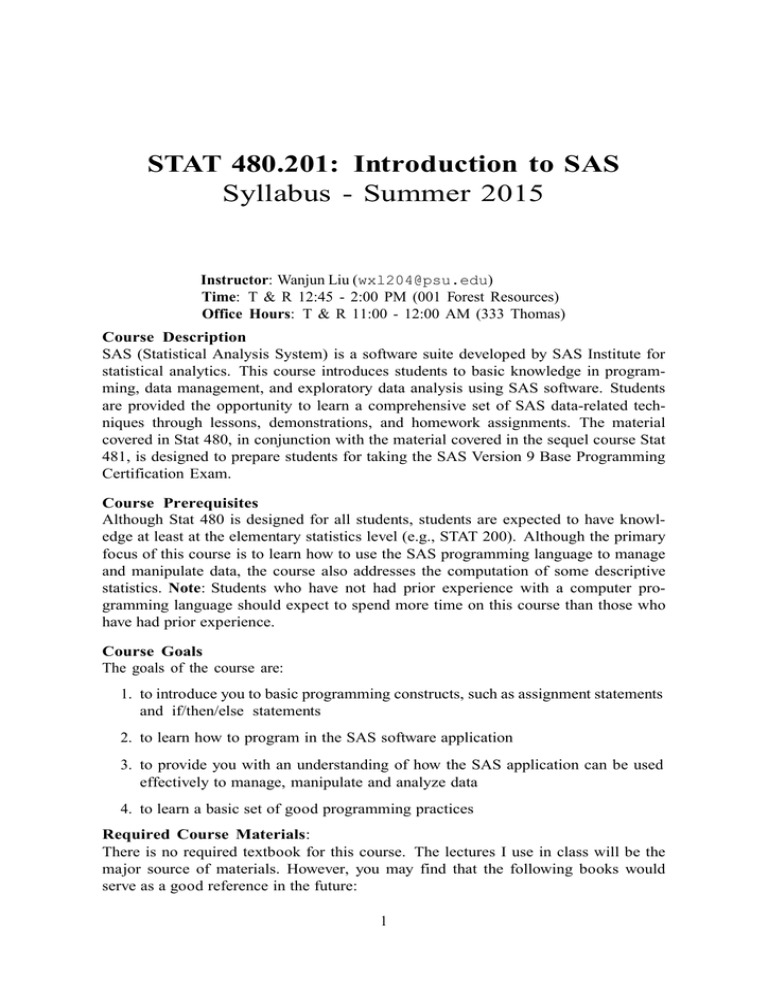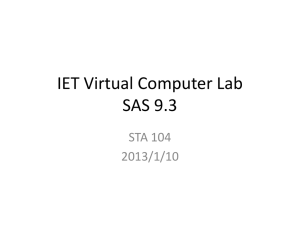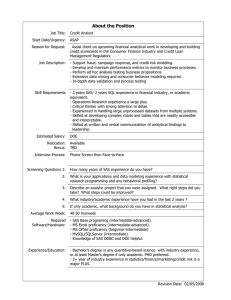
STAT 480.201: Introduction to SAS
Syllabus - Summer 2015
Instructor: Wanjun Liu (wxl204@psu.edu)
Time: T & R 12:45 - 2:00 PM (001 Forest Resources)
Office Hours: T & R 11:00 - 12:00 AM (333 Thomas)
Course Description
SAS (Statistical Analysis System) is a software suite developed by SAS Institute for
statistical analytics. This course introduces students to basic knowledge in programming, data management, and exploratory data analysis using SAS software. Students
are provided the opportunity to learn a comprehensive set of SAS data-related techniques through lessons, demonstrations, and homework assignments. The material
covered in Stat 480, in conjunction with the material covered in the sequel course Stat
481, is designed to prepare students for taking the SAS Version 9 Base Programming
Certification Exam.
Course Prerequisites
Although Stat 480 is designed for all students, students are expected to have knowledge at least at the elementary statistics level (e.g., STAT 200). Although the primary
focus of this course is to learn how to use the SAS programming language to manage
and manipulate data, the course also addresses the computation of some descriptive
statistics. Note: Students who have not had prior experience with a computer programming language should expect to spend more time on this course than those who
have had prior experience.
Course Goals
The goals of the course are:
1. to introduce you to basic programming constructs, such as assignment statements
and if/then/else statements
2. to learn how to program in the SAS software application
3. to provide you with an understanding of how the SAS application can be used
effectively to manage, manipulate and analyze data
4. to learn a basic set of good programming practices
Required Course Materials:
There is no required textbook for this course. The lectures I use in class will be the
major source of materials. However, you may find that the following books would
serve as a good reference in the future:
1
• Delwiche, Lora D. and Susan J. Slaughter (2003), The Little SAS Book, Third
Edition. Cary, NC: SAS Institute, Inc. ISBN: 1-59047-333-7
• Cody, Ronald P. and Jeffrey K. Smith (2006), Applied Statistics and the SAS
Programming Language, Fifth Edition, Upper Saddle River, NJ: Pearson Prentice Hall. ISBN 0-13-146532-5
• SAS Institute Inc. (2006), SAS Certification Prep Guide: Base Programming
for SAS 9. Cary, NC: SAS Institute, Inc. ISBN: 978-1-59047-922-3
If you come across another book that you are considering buying, and you want my
opinion of the book, please don’t hesitate to ask. Additionally, online material of SAS
documentation (SAS 9.1) can be found at http://support.sas.com/91doc/.
Grading
The following is a summary of the requirements for the course, and the weight each
requirement plays in the determination of your final grade.
• 6 homework assignments (weekly) - 30%
Homework is due every Thursday midnight. You should submit an electronic
copy (PDF is preferable) on ANGEL.
• 6 in-class quizzes (every Thusday) - 10%
There will be a quiz at the end of class every Tuesday. You need to finish and
submit your quiz during class time.
• Midterm exam (take home) - 25%
• Comprehensiv final exam (take home) - 35%
Academic Integrity
All Penn State and Eberly College of Science policies regarding academic integrity apply to this course. See http://www.science.psu.edu/academic/Integrity/Policy.
html for details. In particular, on exams, each student must complete his/her own work
without aiding or receiving aid from anyone else in any way. Examples of infractions
that will result in disciplinary action are listed under Categories of infractions on the
ECOS academic integrity page.
ECOS Code of Mutual Respect
The Eberly College of Science Code of Mutual Respect and Cooperation
(http://science.psu.edu/climate/code-of-mutual-respect-and-cooperation/
Code-of-Mutual-Respect%20final.pdf) embodies the values that we hope our faculty, staff, and students possess and will endorse to make the Eberly College of Science
a place where every individual feels respected and valued, aswell as challenged and rewarded.
Disabilities
It is Penn State’s policy not to discriminate against qualified students with documented
disabilities in its educational programs. If you have a disability-related need for modifications in this course, contact your instructor and the Office for Disability Services (located in 116 Boucke Building). Instructors should be notified as early in the semester as
possible. You may refer to the Nondiscrimination Policy in the Student Guide to University Policies and Rules 1997. See the website http://www.equity.psu.edu/ods/
for details.
Emergencies
Campus emergencies, including weather delays, are announced on Penn State Live
(http://psutxt.psu.edu/) and communicated to cellphones, email, the Penn State
Facebook page, and Twitter via PSUTXT (to sign up, please see http://psutxt.
psu.edu).



